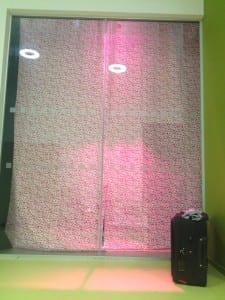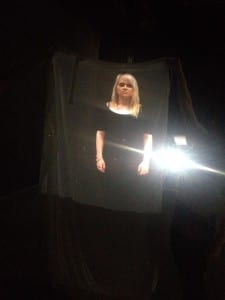At the end of January I had a meeting with my tutor Kelly about whether of not I was right in taking solo performance. My depression at that point was very severe and I lacked all self confidence. Luckily Kelly persuaded me to stick at it and go with my gut instinct and I’m so glad I did. The journey from idea to performance has been filled with highs and lows and with my illness a constant battle, I often struggled to do my work. I would often feel so low I couldn’t face leaving my bed never mind doing my work. But I soon realised the days of struggle influenced my performance hugely. On such days, I would write down how I was feeling in whatever way I could and come back to them on days when I could be positive and productive. These days influenced pieces of dialogue in my performance such as this:
Everyone has battles in life. We all must face demons which arrive in varying forms. Other people, challenges we must overcome; but when the demons are in your own head there is nowhere to escape. You carry them around every second of the day, eating away at your own thoughts, gaining control over your own soul. Until one day, you are overcome. You succumb to its words and the nightmares it plays to you over and over again. It is the scariest thing to lose yourself in your own mind whilst to the rest of the world you must smile. You must put on another face. To keep up the person that everyone saw you as even though in reality, she was lost.
The act of writing down my thoughts and feelings in many ways was rather therapeutic for me, particularly the conclusion of my performance where I discuss the power I have begun to gain in my determination to move forward.
Now I have shared my world, my black and white. I am no longer ashamed of the darkness that infects my life. It is a weakness and an illness which will be overcome. There is so much that gives me purpose and happiness. Life is beautiful and so is each and every one of us, flaws and all.
Because of this, I feel a real connection to Spading Gray and the performances he created from the hardships in his life. Although my performance differed in the style of delivery and aesthetic, we both gained something very positive from expressing our usually private world to an audience in the form of performance. I concur with Auslander’s statement, “Gray does not perform because he feels better – he feels better because he performs” (2005, p.173). I too felt a sense of achievement and a positive progression in myself from both the creative process and the final performance. Despite a few technical hiccups I am very proud of my performance and the most important thing for me was that my audience enjoyed my performance. Their positive and encouraging comments topped off what has been a great experience. The final act of both me and the audience decorating my window was very meaningful for me; seeing my friends and family adding to the window and allowing both our hands to meet on either side of the glass. An emotional end.
(The decoration of the window, 20/5/2014)
Works Cited
Auslander, P (2005) Performance as Therapy: Spalding Gray’s Autopathographic Monolgues. In: Carrie Sandahl and Philip Auslander (eds.) Bodies in Commotion: Disability and Performance. USA: The University of Michigan Press 163-174






